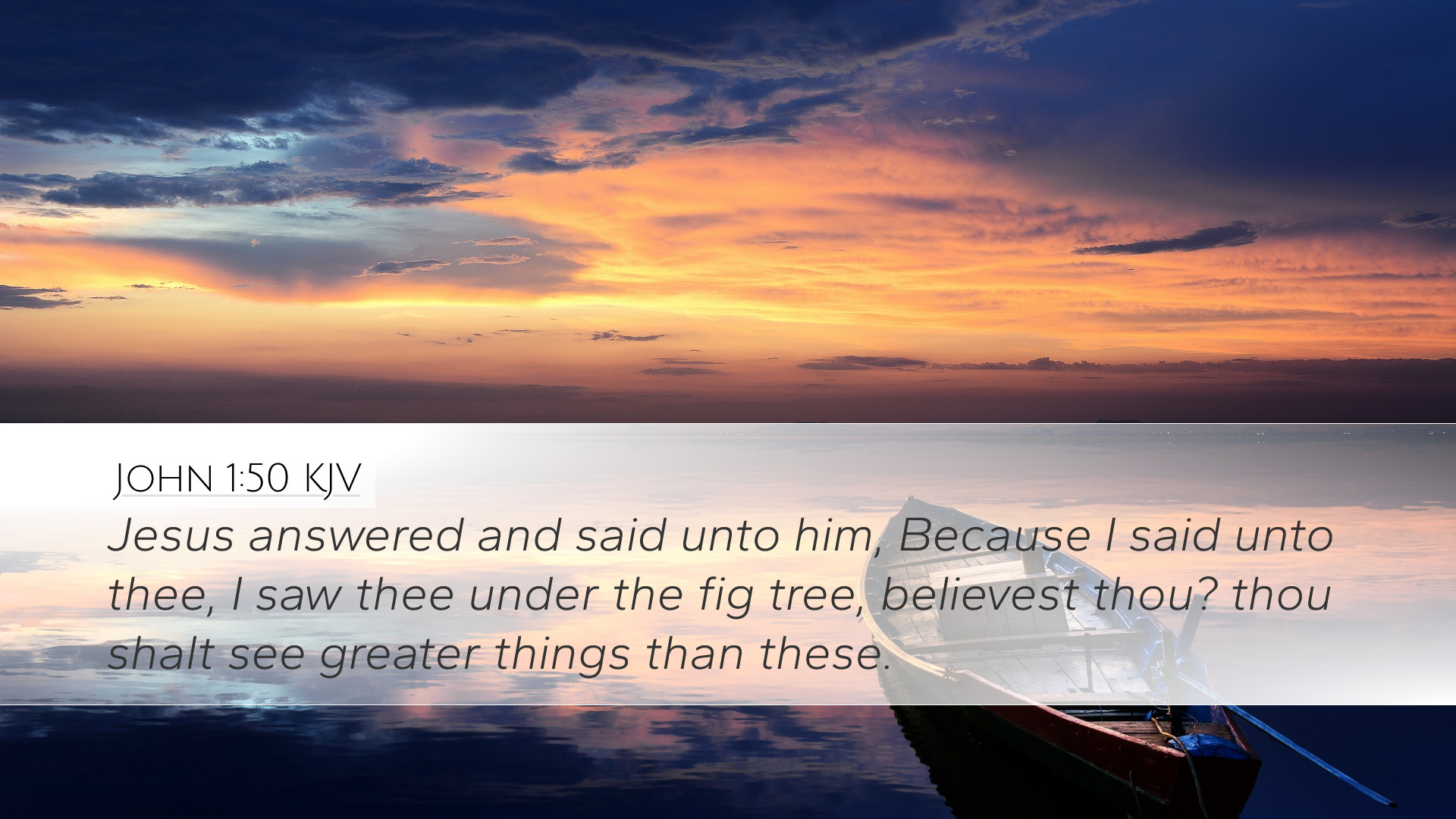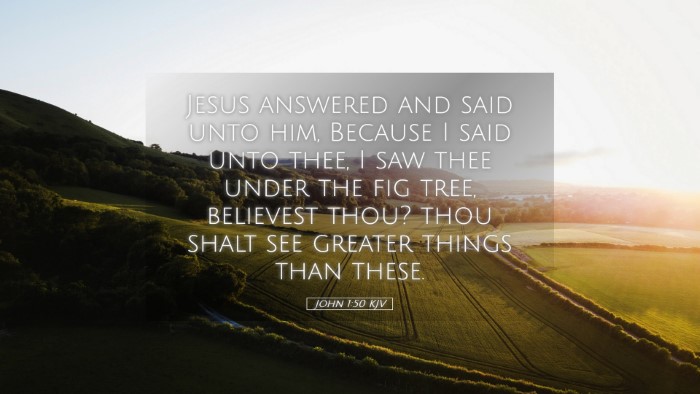John 1:50 - "Jesus answered and said unto him, Because I said unto thee, I saw thee under the fig tree, believest thou? thou shalt see greater things than these."
Introduction
This verse captures one of the key moments in the early ministry of Jesus, where He profoundly impacts Nathaniel by revealing His omniscience. The interaction is not only illustrative of Jesus’ divine insight but also sets the stage for the greater wonders He would reveal throughout His ministry. In this commentary, we draw insights from various public domain resources, providing a rich exploration of this passage.
The Context of the Passage
To fully appreciate John 1:50, it is essential to understand the preceding narrative. John the Baptist, having recognized Jesus as the Messiah, begins to gather disciples, one of whom is Nathaniel. When Philip informs Nathaniel about Jesus, Nathaniel expresses skepticism due to Jesus' origin in Nazareth. The encounter culminates in Jesus revealing knowledge of Nathaniel's previous location under the fig tree, signifying not simply supernatural awareness but also personal knowledge and understanding.
Verse Analysis
“Jesus answered and said unto him”
This greeting indicates a personal and relational interaction. Jesus responds directly to Nathaniel's thoughts and skepticism, emphasizing His role as both teacher and prophet. It portrays the approach of Jesus as both inviting and revealing.
“Because I said unto thee, I saw thee under the fig tree, believest thou?”
Here, Jesus is not merely referencing a simple observation but hints at a deeper, spiritual awakening within Nathaniel. The fig tree is often seen as a symbol of peace and spiritual contemplation in Jewish literature; thus, Nathaniel’s lamenting under the fig tree indicates a moment of personal introspection and prayer.
“Thou shalt see greater things than these.”
This statement serves as a prophetic promise. Jesus acknowledges Nathaniel's faith based on a temporary revelation but assures him that much more lies ahead. Preceding miracles, teachings, and the revelation of Jesus’ divine nature would provide Nathaniel—and all disciples—with a rich depth of understanding and experience of God’s works.
Theological Implications
This passage tackles several key theological themes:
- Omniscience of Christ: Jesus’ ability to perceive Nathaniel’s actions and thoughts demonstrates His divine nature, providing assurance of His omniscience.
- Faith and Revelation: Nathaniel’s belief triggered by a single sign indicates how God often works through small revelations to cultivate deeper faith.
- Greater Expectations: The promise of greater things is a significant theme throughout the Gospels, culminating in the greater works of the Holy Spirit after Jesus' ascension.
Insights from Commentaries
Matthew Henry
Matthew Henry highlights the intimacy of Jesus’ call, noting how personal revelations lead to belief. He emphasizes the significance of Jesus knowing Nathaniel before they even met, which serves as an invitation to explore the depth of Christ's character. Henry interprets Nathaniel’s response as an acknowledgment of Jesus’ divine authority.
Albert Barnes
Barnes reflects on the metaphorical significance of the fig tree, suggesting that it symbolizes spiritual reflection and the Jewish people. He points out that Nathaniel’s faith arose from a humble acknowledgment of Jesus as the Son of God, noting that genuine belief is often rooted in personal experiences of God’s call.
Adam Clarke
Clarke provides an analytical perspective, dissecting the text to emphasize the nature of Nathaniel's faith. He expresses that the encounter exemplifies how Christ reveals Himself progressively to His followers. Clarke also discusses the broader implications of Jesus’ promise that believers would witness greater things, connecting it to the ministry of the early church.
Practical Applications
For pastors, students, and theologians, John 1:50 serves as a reminder of the profound moments of divine revelation that can occur in everyday interactions. It challenges us to consider:
- How personal encounters with Christ have shaped our understanding of faith.
- The way God uses our doubts as a means to reveal truth and encourage deeper belief.
- Our expectations of what God can do in our lives as we anticipate greater manifestations of His glory.
Conclusion
John 1:50 is rich with insights regarding the nature of faith, the character of Christ, and God's grand narrative in revealing Himself to humanity. As we reflect on this verse, let us embrace the personal call of Jesus, aware that our small acts of belief can lead us to witness the greater works He promises.


